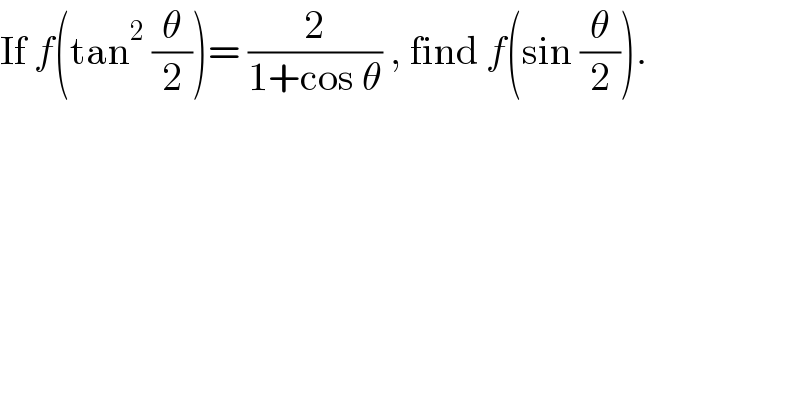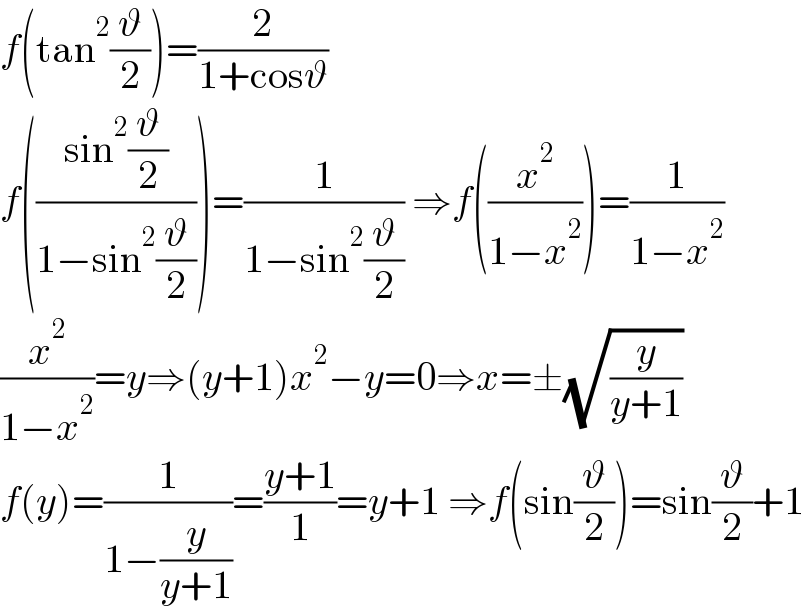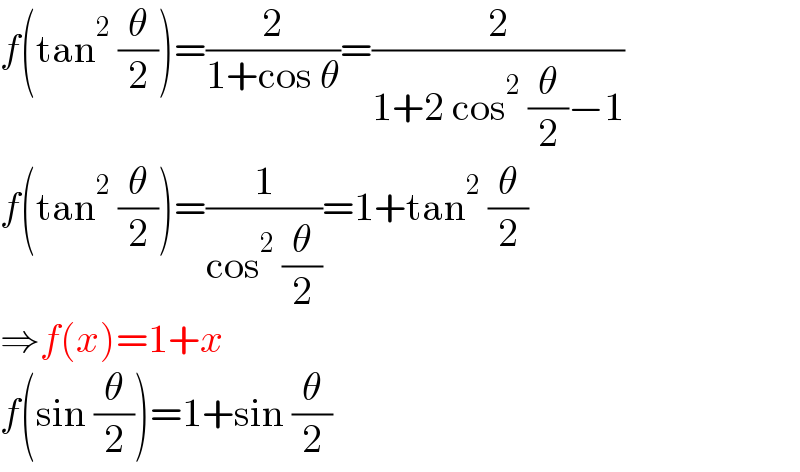Question Number 155527 by ZiYangLee last updated on 01/Oct/21

$$\mathrm{If}\:{f}\left(\mathrm{tan}^{\mathrm{2}} \:\frac{\theta}{\mathrm{2}}\right)=\:\frac{\mathrm{2}}{\mathrm{1}+\mathrm{cos}\:\theta}\:,\:\mathrm{find}\:{f}\left(\mathrm{sin}\:\frac{\theta}{\mathrm{2}}\right). \\ $$
Answered by Ar Brandon last updated on 01/Oct/21

$${f}\left(\mathrm{tan}^{\mathrm{2}} \frac{\vartheta}{\mathrm{2}}\right)=\frac{\mathrm{2}}{\mathrm{1}+\mathrm{cos}\vartheta} \\ $$$${f}\left(\frac{\mathrm{sin}^{\mathrm{2}} \frac{\vartheta}{\mathrm{2}}}{\mathrm{1}−\mathrm{sin}^{\mathrm{2}} \frac{\vartheta}{\mathrm{2}}}\right)=\frac{\mathrm{1}}{\mathrm{1}−\mathrm{sin}^{\mathrm{2}} \frac{\vartheta}{\mathrm{2}}}\:\Rightarrow{f}\left(\frac{{x}^{\mathrm{2}} }{\mathrm{1}−{x}^{\mathrm{2}} }\right)=\frac{\mathrm{1}}{\mathrm{1}−{x}^{\mathrm{2}} } \\ $$$$\frac{{x}^{\mathrm{2}} }{\mathrm{1}−{x}^{\mathrm{2}} }={y}\Rightarrow\left({y}+\mathrm{1}\right){x}^{\mathrm{2}} −{y}=\mathrm{0}\Rightarrow{x}=\pm\sqrt{\frac{{y}}{{y}+\mathrm{1}}} \\ $$$${f}\left({y}\right)=\frac{\mathrm{1}}{\mathrm{1}−\frac{{y}}{{y}+\mathrm{1}}}=\frac{{y}+\mathrm{1}}{\mathrm{1}}={y}+\mathrm{1}\:\Rightarrow{f}\left(\mathrm{sin}\frac{\vartheta}{\mathrm{2}}\right)=\mathrm{sin}\frac{\vartheta}{\mathrm{2}}+\mathrm{1} \\ $$
Answered by mr W last updated on 02/Oct/21

$${f}\left(\mathrm{tan}^{\mathrm{2}} \:\frac{\theta}{\mathrm{2}}\right)=\frac{\mathrm{2}}{\mathrm{1}+\mathrm{cos}\:\theta}=\frac{\mathrm{2}}{\mathrm{1}+\mathrm{2}\:\mathrm{cos}^{\mathrm{2}} \:\frac{\theta}{\mathrm{2}}−\mathrm{1}} \\ $$$${f}\left(\mathrm{tan}^{\mathrm{2}} \:\frac{\theta}{\mathrm{2}}\right)=\frac{\mathrm{1}}{\mathrm{cos}^{\mathrm{2}} \:\frac{\theta}{\mathrm{2}}}=\mathrm{1}+\mathrm{tan}^{\mathrm{2}} \:\frac{\theta}{\mathrm{2}} \\ $$$$\Rightarrow{f}\left({x}\right)=\mathrm{1}+{x} \\ $$$${f}\left(\mathrm{sin}\:\frac{\theta}{\mathrm{2}}\right)=\mathrm{1}+\mathrm{sin}\:\frac{\theta}{\mathrm{2}} \\ $$
